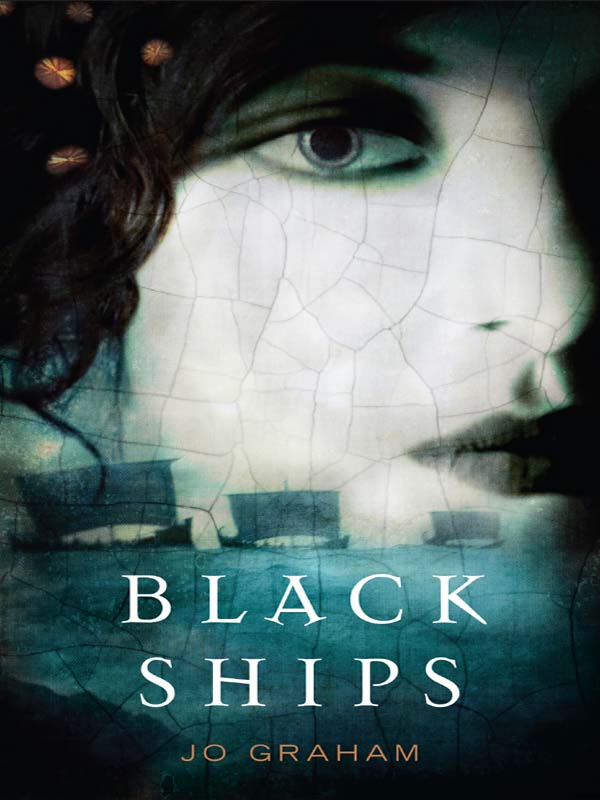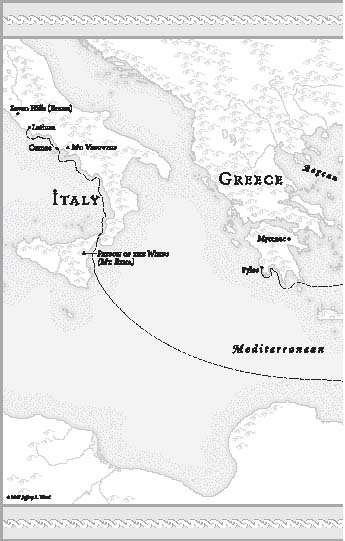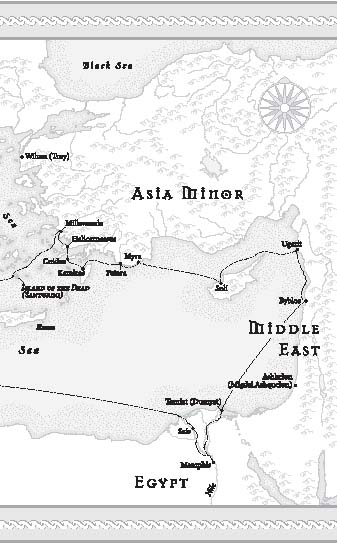Black Ships
Authors: Jo Graham


Contents
Copyright © 2008 by Jo Wyrick
All rights reserved. Except as permitted under the U.S. Copyright Act of 1976, no part of this publication may be reproduced, distributed, or transmitted in any form or by any means, or stored in a database or retrieval system, without the prior written permission of the publisher.
Orbit
Hachette Book Group USA
237 Park Avenue, New York, NY 10017
Visit our Web site at
www.HachetteBookGroupUSA.com
First eBook Edition: March 2008
Orbit is an imprint of Hachette Book Group USA.
The Orbit name and logo are trademarks of Little, Brown Book Group Limited.
The characters and events in this book are fictitious. Any similarity to real persons, living or dead, is coincidental and not intended by the author.
ISBN 13: 978-0-316-02914-8
ISBN 10: 0-316-02914-9
For my father, Glenn Wyrick,
who gave me
The Last of the Wine
when I was eleven and a half


At Pylos in particular groups of women are recorded doing menial tasks such as grinding corn, preparing flax, and spinning. Their ration quotas suggest they are to be numbered in the hundreds.... At Pylos there is even an enigmatic To-ro-ja (woman of Troy), “servant of the god.”
—Michael Wood,
In Search of the Trojan War
PYTHIA
Y
ou must know that, despite all else I am, I am of the People. My grandfather was a boatbuilder in the Lower City. He built fishing boats, my mother said, and once worked on one of the great ships that plied the coast and out to the islands. My mother was his only daughter. She was fourteen and newly betrothed when the City fell.
The soldiers took her in the front room of the house while her father’s body cooled in the street outside. When they were done with her she was brought out to where the ships were beached outside the ring of our harbor, and the Achaians drew lots for her with the other women of the City.
She fell to the lot of the Old King of Pylos and was brought across the seas before the winter storms made the trip impossible. She was ill on the vessel, but thought it was just the motion of the ship. By the time she got to Pylos it was clear that it was more than that.
King Nestor was old even then, and he had daughters of the great houses of Wilusa to spin and grind meal for him, slaves to his table and loom. He had no use for the daughter of a boatbuilder whose belly already swelled with the seed of an unknown man, so my mother was put to the work of the linen slaves, the women who tend the flax that grows along the river.
I was born there at the height of summer, when the land itself is sleeping and the Great Lady rules over the lands beneath the earth while our world bakes in the sun. I was born on the night of the first rising of Sothis, though I did not know for many years what that meant.
My mother was a boatbuilder’s daughter who had lived all her life within the sound of the sea. Now it was a morning’s walk away, and she might not go there because of her bondage. Perhaps it was homesickness, or perhaps something in the sound of my newborn mewing cries, that caused her to name me Gull, after the black-winged seabirds that had swooped and cried around the Lower City.
By the time the autumn rains came, I was large enough to be carried in a sling on my mother’s back while she worked.
I know it was not that year, but it is my first memory, the green light slanting through the trees that arched over the river, the sound of the water falling over shallow stones, the songs of the women from Wilusa and Lydia as they worked at the flax. I learned their songs as my first tongue, the tongue of the People as women speak it in exile.
There were other children among the linen slaves, though I was the oldest of the ones from Wilusa. There were Lydians older than I, whose mothers had come from far southward down the coast, and a blond Illyrian from north and west of Pylos. Her name was Kyla; she was my childhood friend, the one who paddled with me in the river while our mothers worked. At least until she was also put to work. I knew then what my life would be—the steady rhythm of beating the flax, of harvest and the life of the river. I could imagine no more. The tiny world of the river was still large enough for me.
The summer that I was four was the summer that Triotes came. He was the sister-son of the Old King, tall and blond and handsome as the summer sun. He stopped to water his horses, and talked with my mother. I thought it was odd.
A few days later he came again. I remember watching them talking, Triotes standing at his horses’ heads, ankle deep in the river. I remember thinking something was wrong. My mother was not supposed to smile.
He came often after that. And sometimes I was sent to sleep with Kyla and her mother.
My fifth summer was when my brother was born. He had soft, fair baby hair, and his eyes were the clear gray-blue of the sea. I looked at my reflection in the river, at my hair as dark as my mother’s, eyes like pools of night. And I understood something new. My brother was different.
Triotes threw him high in the air to make him laugh, showed him to his friends when they led their chariots along the road. He was barely a man himself, and he had no sons before, even by a slave. He brought my mother presents.
One night I heard them talking. He was promising that when my brother was older he would bring him to the palace at Pylos, where he would learn to carry the wine cups for princes, where he would learn to use a sword. He was the son of Triotes, and would be known as such.
Later, when he had gone, I crept in beside my mother. My brother, Aren, was at her breast. I watched him nurse for a few minutes. Then I laid down and put my head on my mother’s flat, fair stomach.
“What’s the matter, my Gull?” she said.
“I am the daughter of no man,” I said.
I do not think she had expected that. I heard her breath catch. “You are the daughter of the People,” she said firmly. “You are a daughter of Wilusa. I was born in the shadow of the Great Tower, where the Lower Harbor meets the road. I lived my whole life in the sound of the sea. Your grandfather was a boatbuilder in the Lower City. You are a daughter of Wilusa.” My mother stroked my hair with her free hand, the one that did not support Aren. “You were meant to be born there. But the gods intervened.”
“Then won’t the gods intervene again and take us back?” I asked.
My mother smiled sadly. “I don’t think the gods do things like that.”
And so I returned to the river. I was old enough to help the women with the flax in the green cool twilight along the water. And this, I knew, was where I would spend my life.
I don’t remember the accident that changed all that.
We often played along the road that paralleled the river. It was nothing more than a packed track, rutted from chariots and carts. I remember the chariot, much finer than Triotes’, the blood bay horses, the gleaming bronze. I remember staring transfixed. I remember my mother’s scream, high and shrill like a gull herself.
It was fortunate that the rains had begun and the road was muddy. The wheel passed over my right leg just above the ankle, snapping the bones cleanly, but not cutting my foot off, as I have seen happen since. The road was muddy, and the surface gave.
I remember little of that winter. I don’t remember how long I spent on the pallet in the corner where my mother had given birth to Aren. Perhaps it’s childhood distance. Perhaps it’s the essence of poppy that the oldest of the slave women gave me for the pain. I vaguely remember picking at the wrappings around my leg and being told to stop. And that is all.
I do remember the Feast of the Descent, when the Lady returns to the world beneath and greets Her beloved. The dry season was beginning, and the poppies were dying in the fields, the river running shallow and slow.
My right leg was half the thickness of my left above the ankle, and my right foot twisted, the toes turned inward and the heel out. I could stand, just. All that long spring I tried to walk again. By the height of summer I could stumble slowly, holding on to things for balance, but it was clear that I would never run or dance again.
More important, it was clear that I would never work all day in the shallows of the river.
I did not know why my mother left Aren sleeping with Kyla’s mother and took me walking away from the river, up the long dusty track in a way we had never gone. I asked her over and over where we went, but she did not answer, though she carried me part of the way when the road went steeply uphill. I was light enough for six years old.
There was a turn in the road, and we stopped to rest. My mother brought out a water bottle and we shared it. I looked down and away at the size of the world. The river was a track of green, swirled like a snake across the yellows and browns of the landscape. Behind us, the mountains rose in serrated tiers to peaks as dark and as strange as clouds.
“There,” my mother said. “Gull, do you see that?” She pointed to a silver smudge at the end of the river. “There’s so much dust in the air, it’s hard to see. That’s the sea!”
I looked. The world ended, and the silver began.
“Are there gulls there?” I asked.
“Yes,” she said. “That’s where gulls live.”
“Can we go there?” I asked.
“No,” she said.
We put the water skin away and kept climbing. It was not much farther to go.
The track ended at a clearing, the great towering cypress trees green and mysterious, tangled among rocks on the mountainside. I thought at first it was a desolate place and deserted. But there was the buzzing of flies and the smell of goat dung. I looked again and saw that there was a shed off to the side of the track and downhill, a steep path leading down to it. There was another that led upward, between the great trees. That is the one we took.
My mother walked slowly now. The loam sank beneath our feet. The air was hushed and humid.
There was a cleft before us, a cave opening twice as tall as wide, a little taller than my mother. Before it stood a polished black stone, rounded and featureless.
My mother called out a greeting, and her voice seemed very loud in the wood.
A woman appeared in the entrance. I had been expecting something frightening, but she had the red, sweaty face of a woman who has been working when it’s hot, the mended plain tunic of a servant. “What do you want?” she asked.
“To speak with Pythia,” my mother said, squaring her shoulders.
The woman seemed to size her up. “Pythia is very busy. Have you brought an offering? I see no birds or young goat.”
“I have brought my daughter,” my mother said. “Her name is Gull.”
I thought she would tell us to leave, but at that moment I heard a scraping sound just within the entrance. I suppose my eyes went wide. What stood in the doorway was not a woman.
Her hair was as black as night, piled and curled in elaborate pins made of copper. Her long robes were true black. Her face was as white as the moon, her lips black, and her eyes outlined in black as well, like a skull bleached in a field for a long time. She was beautiful and terrifying. Slowly she came toward us. One long white hand reached out and nearly touched my hair. I was frightened, but I did not move. Things would be as they must be.
“Once they brought us princesses, the daughters of kings to serve the Lady of the Dead. Now they bring us the daughters of slaves, girls who are too maimed to work. This is not an honor offering!”
My mother did not look away from her eyes. “She is my daughter, and she is all I have.”
Pythia looked at me. I saw her eyes fall on my twisted leg. Her brow furrowed, and I saw the paint on it crack in the heat. And I knew it was paint, not her own face. “They will not let you keep her and feed her if she cannot work.”
“Gull is a hard worker,” my mother said. “She is courteous and quick to please. She could serve you well.”
“This is not a large Shrine,” Pythia said. “We are not like some others, with handmaidens who have little to do all day. I need a goatherd, not a girl who cannot walk.”
“She could weave,” my mother suggested.
One taloned hand fixed beneath my chin, tilting my face up. Her eyes were as black as mine. She was an old woman. But there was something else beneath the paint.
I don’t know what she saw in my eyes. I can guess, now, these many years later. But Pythia grunted. She turned with something that was almost a shrug. “Leave her here tonight. We will test her. You can return for her tomorrow.”
I saw the tension leave my mother’s face. “I will. Gull, be good and please great Pythia.”
I embraced her, but did not cling. I understood. There was no food for slaves who could not work. My mother was trying to find another mistress for me.
There was at least food tonight. The servant, whose name was Dolcis, brought me a bowl of the same thin porridge they were eating, Pythia and Dolcis both. It was, I thought, the same porridge we ate in the slave quarters by the river, and I said as much.
The old woman looked at me sharply. “The kings used to have some respect for us. They used to bring us fat goats and fresh fish. They used to bring us the first fruits of the vine. Now we are lucky if the country people bring us apples or meal in thank offerings.”
“Why?” I asked.
“They are impious,” Pythia said. “They make their sacrifices to the gods of bulls and storms, to Athene the keen-eyed. They do not bring their gifts to the Lady of the Dead.” She took a bite of porridge. “Who have you made offering to?”
I had never properly made an offering to anyone, but I thought of the libations I had poured in water, or the thin new well-watered wine we sometimes had. “To the Lady of the Sea,” I said.
Pythia grunted. “They are sisters, the Lady of the Dead and the Lady of the Sea. Like sisters will, They quarrel, but always reconcile. It is well.”
After we had eaten, Dolcis cleared the things away. Pythia sat before me in the light of the brazier. Shadows danced on the walls of the cave.
“Are you afraid of the dark?” she asked.
“No,” I said.
“Good,” she said, and smothered the fire with ashes until only a few coals glowed. It was very dark within the cave. I had never been somewhere there was not even starlight. I heard her moving in the dark, the rustling of cloth.
“Sit here,” she said, and I felt her putting a cushion at my back. I sat up upon it. It raised me so that I sat, my legs crossed, leaning almost over the brazier. She put another cushion behind me so that I might lean back against the wall.
There was more rustling, and I smelled the acrid scent of herbs crumbled over the coals. Rosemary. Laurel. And something richer, like resin, like pine carpets beneath my feet. Something heady, like smoke.